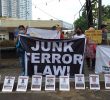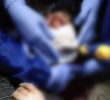CAGAYAN DE ORO CITY, Philippines – Two lawmakers from Northern Mindanao have joined the call against the anti-terror bill (ATB) which was passed on third and final reading at the House of Representatives.
Cagayan de Oro 2nd District Rep. Rufus Rodriguez and Bukidnon 2nd District Rep. John Flores both expressed their opposition to House Bill 6875.
Flores noted that the country’s judicial system is disadvantageous for those who cannot afford proper legal representation.
“Take the 14-day detention (extendable by another 10 days) without judicial warrant of arrest, for instance. As a lawyer, I cannot agree with this kind of infringement of very basic constitutional rights,” he said in a statement released Wednesday, June 3,
The lawmaker noted that the ATB is very prone to abuse and the penalties are too extreme. “Let us fight terrorism while upholding human rights and following due process,” he urged.
Meanwhile, Rufus, in a separate statement, said “the anti-terror bill endangers our civil and human rights.”
“The State should guard against violent terrorist attacks, but should equally uphold the right of freedom of speech, right to peaceably assemble, and the Constitution. This representation from the 2nd district of Cagayan de Oro votes NO,” he noted on his June 3 Twitter post.
No to anti-terror bill
Human rights watchdog Karapatan slammed Pres. Rodrigo Duterte for certifying the bill as urgent to supposedly avail of financial loans and aid to fund the government’s anti-insurgency efforts.
Karapatan narrated that after Duterte pushed for the ATB’s approval, Senate Pres. Vicente Sotto III said the proposed legislation is “as good as passed” and that only terrorists should supposedly fear the measure.
“With Duterte controlling all branches of government, a rubber stamp Congress with not a single ounce of legislative independence is already a clear and glaring sign of dictatorship,” said Cristina Palabay, Karapatan’s secretary-general, in a statement Thursday, June 4.
Palabay said the ATB is a “blatant travesty of democratic checks and balances” and that it “removes necessary human rights safeguards and penalties for abuses from the Human Security Act such as compensation for victims of wrongful detention, while vaguely expanding the definition and scope of what constitutes a ‘terrorist act.”
The bill, she added, will only unleash the most brutal attacks of state terrorism on the people by inflicting harm on civilians and violating standards of international humanitarian law.
When activists are being red-tagged and vilified as “communist terrorists” and when anyone who expresses dissenting opinions on government measures are arrested and jailed, Palabay said, “we have every reason to believe that the bill will not only be prone to abuse. The fascist regime will wield it as a legal weapon against dissent.”
The Samahan ng mga Ex-Detainees Laban sa Detensyon at Aresto (Selda), a group of human rights victims especially during the Marcos dictatorship, said the bill is “a dangerous ingredient to Duterte’s recipe for fascism and dictatorship.”
“Obviously, this is becoming a cooking show and the president is hungry for more power. Now that he has certified the Anti-Terror Bill as urgent, his allies in the legislature are now brewing this law as an add-on to his already tyrannical rule,” said Danilo dela Fuente, Selda spokesperson.
Media organization National Union of Journalists of the Philippines (NUJP), in a joint statement, said they “unequivocally reject the anti-terror bill” adding that the provisions violate the Constitution’s guarantee to due process and constitute a usurpation of judicial power.
The bill, NUJP said, also poses a mortal danger to the principles of freedom of the press and of expression in Section 9 defining the crime of “inciting to terrorism,” which can be committed “by means of speeches, proclamations, writings, emblems, banners or other representations of the same” and is punishable by 12 years in prison.
“Worse, this bill would worsen the impunity with which many of our laws and rights are violated by the very ones sworn to protect and uphold these by doing away with the stiff penalties intended to prevent any abuse of this legislation’s most draconian measure, the extrajudicial arrest, and detention of suspects,” NUJP said. (davaotoday.com)










